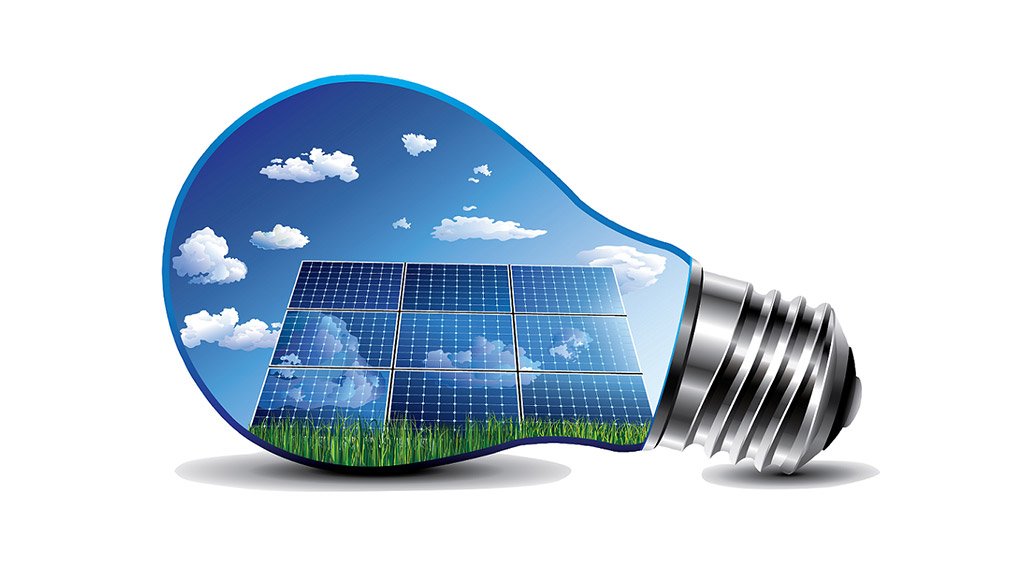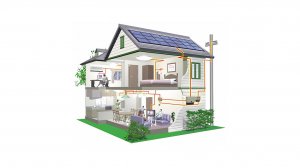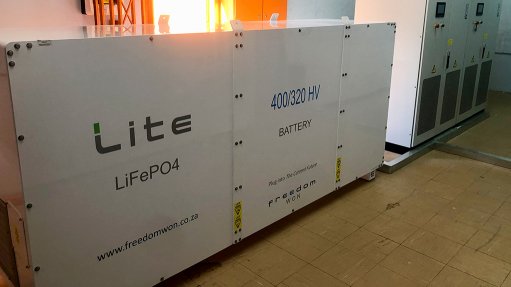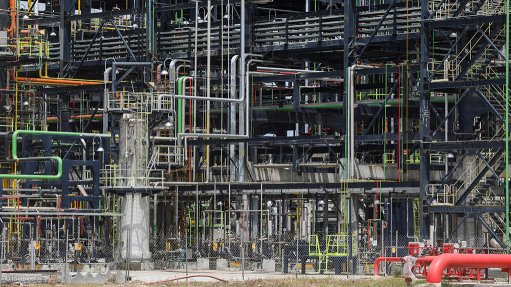Solar Power in your home
This article has been supplied as a media statement and is not written by Creamer Media. It may be available only for a limited time on this website.
Solar energy has exploded over the last decade with the cost of solar panels decreasing, making solar more affordable than ever. Many homeowners have already invested in this to make their homes more environmentally friendly and sustainable, but if you are still investigating the options available to you, this article could assist you in taking that final step towards sustainable living.
“Whether you go completely off-grid or simply supplement your household energy intake with a smaller system it will already be the start to increasing your property value. The primary investment of solar power is often enough to scare one off, however the payback period of your investment, and future rewards, make solar power affordable to most homeowners” comments Craig Hutchison, CEO Engel & Völkers Southern Africa.
What is solar power?
Solar power is the conversion of energy from sunlight into electricity, either directly using photovoltaic (PV), indirectly using concentrated solar power, or a combination of both. It’s renewable, and can be used in a variety of ways to sustainably fuel homes, producing hot water and electricity.
Why consider solar power?
Solar systems require very little maintenance and you could end up saving up to 60% -80% on your electricity bill, depending on the size of your home and what kind of solar energy system you install. Whether you build a new energy efficient house or upgrade your existing one, solar technology will definitely add to the value of your property.
How solar works?
Solar panels collect sunlight and channel it to an inverter, where it’s converted to electricity to power your home.
Photovoltaic (PV) cells convert sunlight to direct current (DC) electricity.
The electrical panel sends power to your lights and appliances.
The meter tracks how much electricity is generated and measures the energy you draw and feed back to the grid.
Some solar electric systems will use batteries to store the unused electricity.
Cost involved?
Solar energy systems can be quite expensive when it comes to installation. The size of your home as well as the amount of work that is involved for installation will determine the cost. The costs are decreasing as new technology is introduced for more efficient solar energy generation.
Cala van der Westhuizen, Head of Marketing and Sales, Energy Partners Home Solutions highlights the main pricing categories as follows:
The complete heating solution costs around R35 000 for the average home.
The complete Solar photovoltaic (PV) system costs upward of R80 000 and should be viewed as a long term investment solution.
The cost of the ICON Home Energy Hub ranges between R100 000 - R180 000.
Some suppliers are approved credit providers and offer financing options for homeowners. Energy Partners has also developed a long term lease model, where the client can simply lease the system instead of having to pay for it upfront.
Where should one start?
Installing a solar system is not just a matter of putting up a few panels and adding a few batteries, there is no standard system, each system has to be correctly sized to suit the requirements of each home. Make sure the company you are dealing with is an established company with a good reputation and can provide the correct advice and service backup.
When investing in solar technology, it is important to prioritise, reducing your heaviest loads first, as this will deliver the greatest savings:
Start by replacing the home’s light bulbs with energy efficient lighting.
Replace your home’s geyser with a heat pump, or solar geyser. A highly insulated hot water storage system can also cut the homes electricity costs by an estimated 50%.
A solar photovoltaic (PV) system can provide up to 30% of an average home’s energy. It is hugely beneficial in the long-term and must be viewed as an investment. However, before embarking on this, it is important to understand whether the home’s rooftop has been designed to accommodate the optimal number of panels.
Lastly, homeowners can choose a complete integrated system. A hybrid inverter and battery, such as Energy Partners’ own ICON Home Energy Hub, enables property owners to integrate power from their solar PV panels, the national grid and batteries. It also incorporates a mobile app to track energy usage and savings in real time.
Latest technology
Until a few years ago solar panels were a scarce sight and largely limited to the roofs of affluent households. This has changed rapidly in the last ten years; the specific development in solar energy has seen the sharp drop in prices and an increase in technological advances in solar technologies and in power storage.
According to Cala van der Westhuizen from Energy Partners Home Solutions, solar panels are currently at the top of their game. Storage is improving constantly and lithium ion batteries are currently the preferred technology with many other technologies in battery storage being developed. Another exciting product that has been introduced is a DC element and solar PV conversion that can be applied to your current geyser.
As technology improves, the cost of the technology will decrease and investment recovery periods for the solar equipment and devices will become much shorter.
Pros
Saves money - after the initial setup costs have been taken care of, you will start to benefit from having solar energy by reducing your electricity bills and see it is indeed a return on investment.
Increase property value - buyers are increasingly interested in eco-friendly homes and the increased efficiency with a pre-installed solar panel system is an added bonus.
Reduces your carbon footprint - solar power is environmentally friendly and doesn’t produce any carbon emissions, it’s clean and renewable, which allows you to do your bit to alleviate global warming.
Low maintenance - once you have your solar energy system installed, you don’t need to maintain it, once you’re equipped you’re set to enjoy years of trouble free energy.
Multi-functional - solar power can be used in many ways namely to generate electricity, charge batteries, power lights and heat water.
Cons
High initial cost - to install solar power in your home will require a substantial initial investment.
Weather dependent - solar panels need direct sunlight to gather solar energy effectively. A period of cloudy, rainy days can have a noticeable effect on the energy system. Unless you include a system of batteries with enough capacity to store up energy to last your home through the night, as well as days/weeks when it may be raining or overcast.
Positioning is important - household and other structures do not always allow for the ideal positioning of solar panels on your property. If you install them in an area that doesn’t get much sunlight, you will still get some energy but you won’t get the full benefits.
Solar energy storage is expensive - solar energy must either be used immediately or stored in deep cycle solar batteries with PV inverters. The batteries can often be large and heavy, taking up space and needing to be replaced from time to time.
Space required - extensive space is needed to house enough solar panels for significant electricity production.
The sun is an unbeatable source of renewable energy, providing us with more energy in a single hour than the world's population uses in one year, if you are looking for ways to boost sustainability in your home, having solar power is key. As electricity prices soar and the cost of solar power installation decline, a renewable energy investment is increasingly looking like a smart choice for all homeowners.
Comments
Press Office
Announcements
What's On
Subscribe to improve your user experience...
Option 1 (equivalent of R125 a month):
Receive a weekly copy of Creamer Media's Engineering News & Mining Weekly magazine
(print copy for those in South Africa and e-magazine for those outside of South Africa)
Receive daily email newsletters
Access to full search results
Access archive of magazine back copies
Access to Projects in Progress
Access to ONE Research Report of your choice in PDF format
Option 2 (equivalent of R375 a month):
All benefits from Option 1
PLUS
Access to Creamer Media's Research Channel Africa for ALL Research Reports, in PDF format, on various industrial and mining sectors
including Electricity; Water; Energy Transition; Hydrogen; Roads, Rail and Ports; Coal; Gold; Platinum; Battery Metals; etc.
Already a subscriber?
Forgotten your password?
Receive weekly copy of Creamer Media's Engineering News & Mining Weekly magazine (print copy for those in South Africa and e-magazine for those outside of South Africa)
➕
Recieve daily email newsletters
➕
Access to full search results
➕
Access archive of magazine back copies
➕
Access to Projects in Progress
➕
Access to ONE Research Report of your choice in PDF format
RESEARCH CHANNEL AFRICA
R4500 (equivalent of R375 a month)
SUBSCRIBEAll benefits from Option 1
➕
Access to Creamer Media's Research Channel Africa for ALL Research Reports on various industrial and mining sectors, in PDF format, including on:
Electricity
➕
Water
➕
Energy Transition
➕
Hydrogen
➕
Roads, Rail and Ports
➕
Coal
➕
Gold
➕
Platinum
➕
Battery Metals
➕
etc.
Receive all benefits from Option 1 or Option 2 delivered to numerous people at your company
➕
Multiple User names and Passwords for simultaneous log-ins
➕
Intranet integration access to all in your organisation























